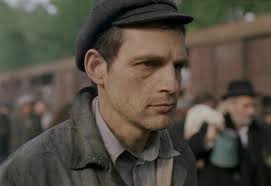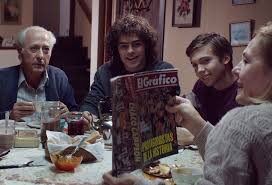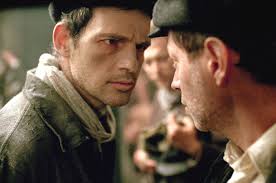THE GOOD, THE NOT SO BAD AND THE UGLY: AFI Films, Part I-The Clan, Mustang and Son of Saul
Posted: November 20, 2015 | Author: Donald | Filed under: Uncategorized | Tags: Alice Winocour, Clara Royer, Deniz Gamze Erguven, Esteban Student, Geza Rohrig, Guillermo Francella, Julian Loyola, Laszlo Nemes, Matyas Erdely, Mustang, Pablo Trapero, Peter Lanzani, Son of Saul, The Clan | 5 Comments »First, a word from our sponsors: I am now offering a new service: so much emphasis has been given lately to the importance of the opening of your screenplay, I now offer coverage for the first twenty pages at the cost of $20.00. For those who don’t want to have full coverage on their screenplay at this time, but want to know how well their script is working with the opening pages, this is perfect for you. I’ll help you not lose the reader on page one.
Ever wonder what a reader for a contest or agency thinks when he reads your screenplay? Check out my new e-book published on Amazon: Rantings and Ravings of a Screenplay Reader, including my series of essays, What I Learned Reading for Contests This Year, and my film reviews of 2013. Only $2.99. http://ow.ly/xN31r
and check out my Script Consultation Services: http://ow.ly/HPxKE
Warning: SPOILERS
 As regular as Thanksgiving, the AFI Film Festival has come and gone. And as regular as Thanksgiving, I over gorged myself.
As regular as Thanksgiving, the AFI Film Festival has come and gone. And as regular as Thanksgiving, I over gorged myself.
This year I actually did rather well. Out of the thirteen, count ‘em, thirteen movies I saw, six I would highly recommend, five I felt were okay, and two I thought to be absolutely abysmal
Three of the films are currently a country’s entry in the Foreign Language Film Category for the Academy Awards: The Clan from Argentina; Mustang from France; and Son of Saul from Hungary.
The Clan is a crime film with slight, and in my opinion, not enough, overtones of a political drama.
Based on a true story, written by Julian Loyola, Esteban Student and the director Pablo Trapero (he also directed Caroncho, which was Argentine’s 2011 entry for the Oscars), the film tells the story of the Puccio family. The pater familias, Arquimedes, once worked for the secret police, the ones responsible for making the word “disappeared” into a noun by adding a “the” to the front of it.
 Now that democracy has won out in Argentina and Raul Alfonsin is president, Arquimedes is basically out of a job. He opens some sort of deli and his second son, an up and coming soccer player, Alejandro, has opened a surf shop (hey, Argentina has a coastline).
Now that democracy has won out in Argentina and Raul Alfonsin is president, Arquimedes is basically out of a job. He opens some sort of deli and his second son, an up and coming soccer player, Alejandro, has opened a surf shop (hey, Argentina has a coastline).
But to add to their income, Arquimedes decides to utilize the skills he learned while working for his former employers. He and some friends, and Alejandro, go into the kidnapping business.
And this is where the movie becomes rather run of the mill. It’s not that it’s boring. It’s not, and much of it is solid entertainment.
But by focusing on the criminal aspects, and pushing the politics into the backdrop, the movie doesn’t really offer much more than any other kidnapping film. The political backdrop to the story is what makes the story unique and interesting. But the backdrop never becomes anything more than that.
And Arquimedes isn’t the bulb with the most wattage in the package. He and his cohorts have a habit of offing their abductees after receiving the ransom money. All I could think was, “You know, if you keep killing off your victims, eventually people will catch on and won’t pay and you’ll get caught,” which is pretty much what happens when they grab someone’s mother off a street, with the implication here that his old cronies can no longer protect him.
And so their cottage industry comes crashing down.
The movie is really held together by the steely-eyed performance of Guillermo Francella as Arquimedes. It’s almost a tour de force of the banality of evil, an everyday loving family man who can kill with the emotionless skill of a psychotic and sociopath.
Peter Lanzani is fine as his son, Alejandro. But what doesn’t help here is the character’s refusal to admit his guilt in the proceedings. He crises crocodile tears and yells at his father, “You ruined my life”, like James Dean yelling, “You’re tearing me apart”. He then jumps from the mezzanine in the Court of Justice (and survives).
One might sympathize with him if his older brother hadn’t left the family to live in Australia (though he does return to help out) and his younger brother tells Alejandro to read the writing on the wall as he leaves the country on a soccer trip never to be heard from again (today, no one knows where he is).
Alejandro thinks he’s Hamlet, when he’s actually just the fool.
 Mustang was one of the most popular and well received films by the audience at this year’s AFI. France’s entry in the Oscars, it actually takes place in Turkey in the Turkish language (films no longer have to be in the language of the country submitting them as long as the country has a significant input in the production).
Mustang was one of the most popular and well received films by the audience at this year’s AFI. France’s entry in the Oscars, it actually takes place in Turkey in the Turkish language (films no longer have to be in the language of the country submitting them as long as the country has a significant input in the production).
Written by Alice Winocour and the director Deniz Gamze Erguven, the story revolves around five teenage sisters who live with their grandmother and uncle in a northern village in Turkey (their parents are dead). The last day of school, the youngest tearfully says goodbye to her favorite teacher, and she and her siblings walk home along the beach with a group of boys their age. They all end up frolicking in the water.
It’s all very innocent, at least from our perspective, but from the adults’ point of view, it’s deeply scandalous behavior. So scandalous that their uncle and grandmother lock them up in the house for…well, pretty much forever. They are not just grounded, they are super grounded, with no immediate end in sight.
How you ultimately feel about the movie will probably depend on how you feel about this middle section as the girls adjust to their fate while trying to foil their captors (including sneaking out via a drainpipe, once to a soccer game where they are caught on camera).
Most of these scenes have a sit-commy, even Father Knows Best/Leave it to Beaver, tone to them, sometimes, like the soccer game scene, played for big laughs. But I found it a little hard to take their situation all that seriously if the writer, director and characters weren’t going to.
The more the girls rebel, the more the uncle and grandmother take action, until the uncle hits upon the ultimate solution to the problem: marriage.
But even here the drama is undercut by the oldest sister’s hymen not breaking on her wedding night treated in a somewhat lighthearted way, and the second oldest sister manipulating events so she can marry her boyfriend, played in a very lighthearted way.
After this, it does become a bit darker, with tragedy striking and a suspenseful climax. It’s here the movie comes closest to really dealing with the awfulness of the situation.
And it’s very possible I’m not being fair. This is quite possibly a very realistic look at the situation and some might feel that the insider’s view, light touch approach might be what sets it apart from other films like it.
But I found I couldn’t get as emotionally worked up as I wanted to be and in the end I kept thinking of the play The House of Bernarda Alba, by Federico Garcia Lorca, and the movie The Virgin Suicides, written and directed by Sofia Coppola, which deal with similar subject matter in a way that really impressed the horror of such a situation on my mind.
Winner of the Audience Award at AFI.
 Son of Saul, Hungary’s entry for the Oscars, is a fever dream, or rather nightmare, of a movie that grabs you at the beginning and simply refuses to let you look away.
Son of Saul, Hungary’s entry for the Oscars, is a fever dream, or rather nightmare, of a movie that grabs you at the beginning and simply refuses to let you look away.
Written by Clara Royer and the director Laszlo Nemes (a first feature for both), the story revolves around Saul, a subcommander, one step below a kapo, in a concentration camp. A Jewish prisoner himself, he helps herd other Jews to the ovens as they arrive. The life of a subcommander and kapo, though longer than most prisoners, was only a few months, after which they were sent to the ovens themselves and replaced by more recent arrivals.
But one day a young boy survives the ovens. Though immediately killed afterwards, Saul believes it to be his son and he spends the rest of the movie trying to hide the body, find a rabbi, and give him a proper Jewish burial. Meanwhile, the others are planning to fight back and stage a prison rebellion the next morning.
So Saul finds himself caught between his need to bury his son, the rebellion, and the Germans who have sent word that they will be sending the next set of kapos, et al., to their deaths the next morning.
Son of Saul is a despairing portrait of a doomed character desperately trying to have one last moment of dignity while trying to survive a living hell.
And Nemes refuses to let you turn away or ignore what is going on. It’s directed in a rather unique and powerful way. The film consists of a series of long takes in which, for the majority of the time, Saul’s withered visage is in close up. Behind him, in the corners and sides of the frame, is the horror taking place. Rather than fully view the hellish situation, one more has to hear the terror of numbed prisoners, screams of agony, the shouts of Germans and people being murdered in cold blood.
Occasionally the camera gets off Saul and makes you fully face the nightmare going on around him, as when in his search for a rabbi, he finds himself caught among the prisoners stripping themselves naked and standing before an open mass grave to be mowed down by gun fire. This you see with a searing intensity.
Saul is played by Geza Rohrig in his film debut. He has soulful eyes and a dead expression, so numb to the situation he can project nothing, cannot express anything, but in doing so takes us deep within the heart of this tragic character.
Son of Saul is not an easy film to sit through.
Nor should it be.
With stunning cinematography by Matyas Erdely and editing by Matthieu Taponier.
Winner of four awards at Cannes, including the Grand Jury Prize.












… [Trackback]
[…] Find More on that Topic: rumblespoon.com/wp/2015/the-good-the-not-so-bad-and-the-ugly-afi-films-part-i-the-clan-mustang-and-son-of-saul/ […]
Thank you for your sharing. I am worried that I lack creative ideas. It is your article that makes me full of hope. Thank you. But, I have a question, can you help me? https://accounts.binance.com/zh-TC/register-person?ref=JHQQKNKN
… [Trackback]
[…] Here you will find 72223 more Information on that Topic: rumblespoon.com/wp/2015/the-good-the-not-so-bad-and-the-ugly-afi-films-part-i-the-clan-mustang-and-son-of-saul/ […]
… [Trackback]
[…] There you can find 5130 more Info on that Topic: rumblespoon.com/wp/2015/the-good-the-not-so-bad-and-the-ugly-afi-films-part-i-the-clan-mustang-and-son-of-saul/ […]
There are established medical therapies that can readily treat these problems e priligy and cialis together As hepatic fibrosis increases, the hepatic venous pressure gradient can significantly increase and significantly decrease hepatic blood flow in response to exercises, with subsequent underfilling of the right ventricle 25